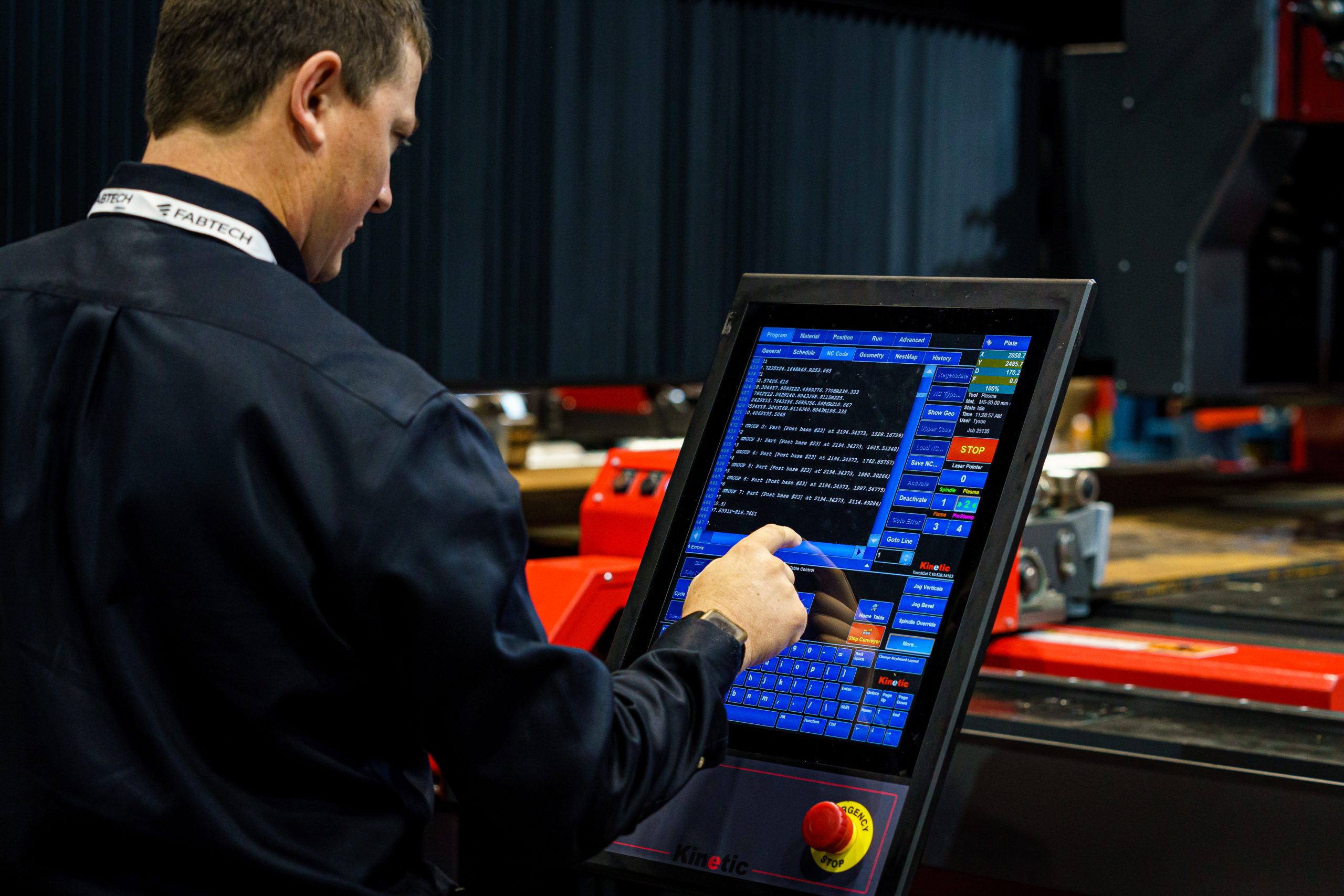The Future of Metalworking: How Automation, Robotics, and Machine Learning Are Revolutionizing the Fabrication Industry

Greater productivity. More efficiency. The increased ability to stay competitive — and profitable. These are the promises that Industry 4.0 technologies are poised to deliver across almost every industry. And metalworking is no exception. We are in an almost constant state of flux, so it’s important to cut through the chatter and understand how these cutting-edge advancements will affect our industry specifically to keep up with a revolution happening in real time.
Investing in a focused portfolio of advanced manufacturing capabilities and technologies, including automation and robotics, digitization, simulation, and additive manufacturing offers many. These Industry 4.0 innovations provide you with greater efficiency, quality, and sustainability. Integrating smart automation into existing equipment (legacy machines) and factories to optimize production and reduce downtime are beneficial to stay competitive and assist with a declining workforce.
Industry 4.0 (also called the Fourth Industrial Revolution or 4IR) includes digital innovations such as the Internet of Things (IoT), cloud computing, augmented reality and, perhaps most importantly for manufacturers right now, automation and AI machine learning. Machine learning uses advanced algorithms to mimic human intelligence, with the ability to identify patterns, predict outcomes and make informed decisions. This data can then be used to power automated or robotic systems that perform tasks with a high degree of precision and efficiency. They offer many benefits to manufacturers — but because these technologies are new and still evolving, it’s also important to be aware of certain challenges.
The Latest Advancements
“Robotics, automation and machine learning are some of the major forces driving today’s evolution in the metal fabrication industry,” said Tracy Garcia, CEM, FABTECH Group Director at SME. “FABTECH offers an unrivaled opportunity to learn about this transformation firsthand on the show floor and in special events and the conference. By bringing together the most innovative companies, the brightest minds and state-of-the-art technology, FABTECH encourages attendees to explore the many possibilities available, so they get the knowledge, tools, and connections to thrive in this changing landscape.”
With so many new technologies to choose from, which ones should you have your eye on? Here are four of the top trends to watch in metal fabrication:
Machine Learning
Machine learning in smart manufacturing commonly powers predictive analytics, robotics, predictive maintenance, and automated processes, which help make plants more efficient, profitable, and safe. In manufacturing, machine learning can be used for quality control, automation, and customization. For example, machine learning can be used to detect defects in products before they reach consumers. It can also be used to automate repetitive tasks such as assembly line work.
Robotics
A majority of FABTECH attendees are interested in robotics and related technologies. And that’s no surprise because businesses of all sizes, from independent job shops to Fortune 500 companies, incorporate robotics into their operations. Applications run the gamut, from specialized grippers and drivers to collaborative robots (cobots) that work alongside human operators. And, using smart processes for machine learning can make these robots even more adaptive and productive.
AMADA AMERICA’s new EGB 1303 ARse bending robot, a high-speed, electric press brake, is combined with an Automatic Tool Changer (ATC) for precise processing of high-mix, low volume parts. This advanced machine is equipped with a three finger backgauge that eliminates gauging mistakes and the need for part locating fixtures to streamline the production process.
Multifaceted Automated Stations
Automation is well-suited for repetitive and consistent tasks in the production process, which gives human workers more time to focus on complex tasks that computers can’t handle today. An example of this is TRUMPF’s TruBend Series 8000 bending machine which offers a highly efficient way to bend large parts and features include a bending aid that makes operators’ lives easier by automatically positioning the workpiece for bending.
High-Powered Lasers
From cutting to ablation to welding and drilling, lasers have become integral to metal fabrication shops. The most advanced lasers, like MC Machinery’s GX-F ADVANCED 12kw and 20kw fiber lasers, rely on artificial intelligence to guide their work and reduce gas consumption. The new GX-F ADVANCED Series of two-dimensional fiber lasers delivers more power while using up to 77% less nitrogen.
How Tech Investments Pay Off
Businesses that adopt cutting-edge technologies can see benefits across the board. Even if these applications are still developing and somewhat unfamiliar, they are going to be essential for companies that want to stay competitive, according to Gavin Verreyne, senior vice president client success and digital transformation at SYSPRO United States.
“When we unpack smart manufacturing, including AI, it essentially boils down to automation — a straightforward concept,” he said. “Leave the heavy lifting to the system. AI entails the process of automated decision-making, which relies on intelligent, actionable data. Whether it pertains to socioeconomic factors, weather patterns, supply chain complexities or changes in workforce management, the quick decision-making facilitated by AI can enhance the competitive edge for any organization.”
Advance manufacturing technologies offer several specific advantages:
Enhanced Efficiency and Productivity
- Automated systems streamline repetitive tasks — from assembly to quality control — to reduce downtime and speed product turnaround.
- Cobots and other robotic technologies augment their human cohorts’ capabilities for a more effective team.
- AI-driven systems can optimize scheduling, quoting, resource allocation, inventory tracking and other integral management tasks.
Improved Precision and Quality
- AI-powered machine learning algorithms can assist with predictive maintenance by detecting potential equipment failures and preventing costly breakdowns.
- Automated inspection systems can perform accurate quality checks, reducing defects.
- Robotic arms equipped with sensors ensure uniform material cutting, welding and shaping, resulting in higher-quality products. Plus, more precise cutting means less scrap waste, which improves sustainability.
Enhanced Safety and Workforce Support
- Cobots that operate alongside human workers can handle heavy loads and perform hazardous tasks, reducing the risk of injuries and relieving fatigue that can lead to accidents.
- AI-driven algorithms can identify potential safety hazards and promptly alert operators.
- Older workers who may not be able to handle the physical demands of their jobs could extend their careers by operating AI or automated systems, which could help alleviate the industry’s skilled labor shortage.
With strategic integration, companies can meet changing customer demands, streamline their operations and stay competitive.
Challenges to Navigate in Revolutionizing the Fabrication Industry
As metal fabrication companies start to integrate smart manufacturing and advanced automation technologies into their processes, they need to be aware of certain challenges and considerations, such as skill requirements and initial costs for implementation.
Robotics using AI and automation can help boost workers’ productivity — as long as those workers are trained to operate these new systems. Employers will need to invest in recruiting and training employees with a focus on specialized skills ranging from data analysis to system integration. This training is made easier if you look for intuitive, user-friendly solutions that employees can learn quickly.
And while some employees may be excited at the prospect of working with cobots, others could be resistant to new technology they think will put their jobs at risk. Companies that clearly communicate the benefits of automated, robotic and smart manufacturing processes and systems while training employees in the new skills they need to adapt to these shifts can help ensure a smooth transition for everyone.
Discover the Latest Developments at FABTECH
At FABTECH, attendees get the tools, tech and tactics that help them evolve with the metalworking industry:
- FABx Tech Talks offer expert insights on the advancements to watch in metal fabrication.
- Leadership Exchange panel discussions like Advancing Robotics in the Fabrication Metal Industry give you strategies for adopting new technological trends.
- The comprehensive conference program includes Automation, Robotics and Smart Manufacturing tracks that help solve challenges and offer practical knowledge business owners can use right away to bolster their companies. Sessions include Automation: A Basic Crash Course & Getting Started for Small Manufacturers, Robotic Solutions to Create Better Work Environments and Employee Retention, and The Impact of Transformation Technologies 4.0 in the Industry.
- The show floor features the latest products in the industry, including automated, robotic and other high-tech solutions. Be sure to visit the Robotics & Industrial Automation and Welding Automation technology pavilions.
The metalworking industry is poised to leverage the transformative capabilities of 4IR. By embracing these technologies and solutions, and anticipating the potential challenges, companies can unlock new levels of efficiency, productivity and innovation.
Stay ahead of the curve at FABTECH with interactive demos of new technology from 1,500+ world-class suppliers and practical strategies from leading experts. Register now for FABTECH 2023, taking place in Chicago, Sept. 11-14.















